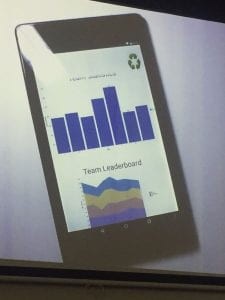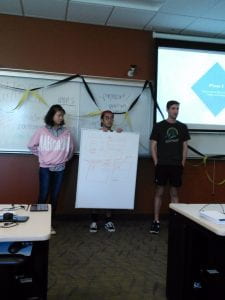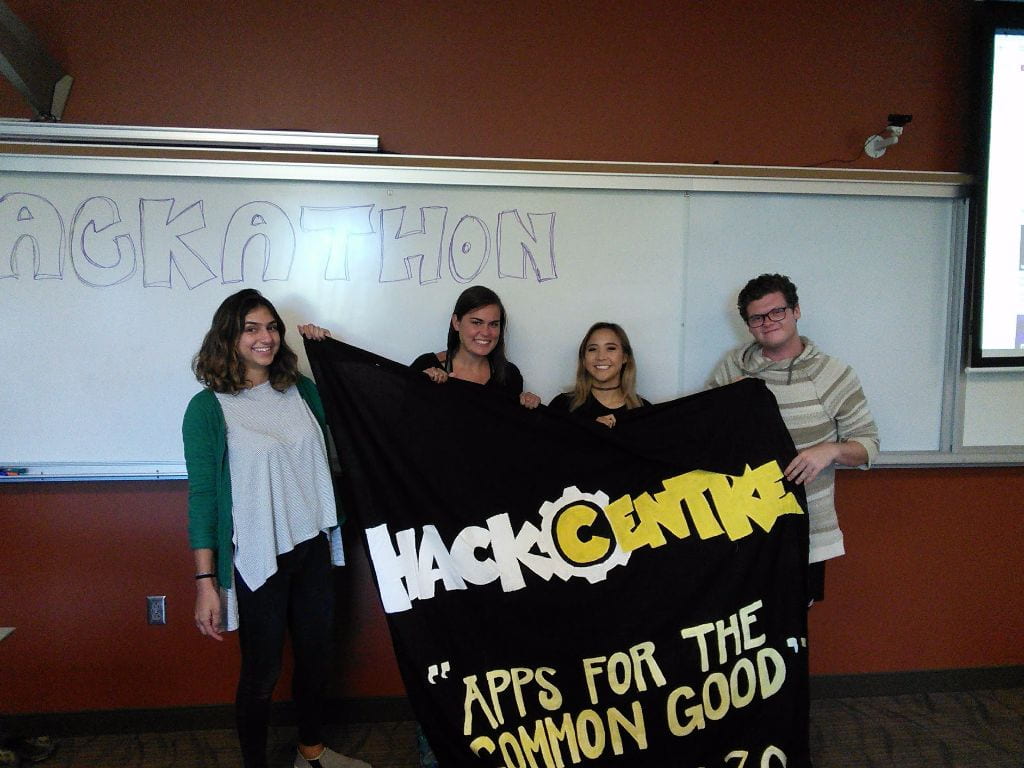BY PEYTON POPP – STAFF WRITER
 The word “Hackathon” seems a little iffy. It’s a combination of two words the average American probably doesn’t like very much: hack and marathon. Of course, hacking is commonly imagined as a devious dweeb dubiously hunched over a computer screen in his mother’s basement searching for ways to steal your poor, technologically challenged grandmother’s credit card information or some other crazy cyber crime. Likewise, the word marathon just conjures up the idea of sweating for 26.2 miles, which is crazy in and of itself. Yet when you mix these two things together, you get something special.
The word “Hackathon” seems a little iffy. It’s a combination of two words the average American probably doesn’t like very much: hack and marathon. Of course, hacking is commonly imagined as a devious dweeb dubiously hunched over a computer screen in his mother’s basement searching for ways to steal your poor, technologically challenged grandmother’s credit card information or some other crazy cyber crime. Likewise, the word marathon just conjures up the idea of sweating for 26.2 miles, which is crazy in and of itself. Yet when you mix these two things together, you get something special.
Before you get yourself in a tizzy over what your fellow Centre students are up to, no one (at least no Centre student involved in the event) was hunched over a computer trying to “hack” into your beloved grandmother’s bank account, nor was anyone doing anything drastic like a 26.2 mile run.
A Hackathon is a design-sprint where teams—in this case, teams of two or three—try to design and code an app prototype to the best of their ability over a set time period; these large events can last days, but luckily, Centre’s only lasted five hours.
These events have gone on for over a decade and have produced well-known apps such as GroupMe, a popular messaging app which was created during the TechCrunch Disrupt Hackathon in 2010 and is now owned by Microsoft. Many major tech companies and prestigious colleges and universities across the country have hackathons.
The ones for “hard-core” programmers might have a focus as vague as “create something in JavaScript,” and then the hackers are off to the races. Others operate on a much more directed scale, like Centre’s, where the goal of the apps being created is less to show competency in a certain programming language and more to have as many minds as possible addressing a particular problem.
So, on Saturday, 16 Centre students, myself, and Dr. and Mrs. Bradshaw (along with their daughter) gathered in one of Young Hall’s computer labs to create prototypes for five different apps, problem-solve, and eat pizza.
The event’s founder, senior Michelle Kim, is excited to pass the legacy of Centre’s Hackathon on to next year’s Computer Science Club and the next round of Computer Science enthusiasts and majors. It is, from the event’s very slogan, “Creating Apps for the Common Good,” evident that the focus of this event is not on things like knowing Python or HTML5 or Java or whatever programming language. The focus, instead, is on helping out an on-campus group; this year it was the Centre Environmental Association (CEA), and, as such, the apps were centered around encouraging Centre students to be more conscientious of the effects their actions have on the environment.
 Sunday, judgement day, CEA and other judges made the ruling on which app won. “We want to start encouraging people on campus to be more conscious of all the little things we’re doing that cause harm to the environment, especially considering the current political climate towards the environment and the recent natural disasters,” Kim said, explaining why CEA was chosen as the first on campus group to be the target of app designs.
Sunday, judgement day, CEA and other judges made the ruling on which app won. “We want to start encouraging people on campus to be more conscious of all the little things we’re doing that cause harm to the environment, especially considering the current political climate towards the environment and the recent natural disasters,” Kim said, explaining why CEA was chosen as the first on campus group to be the target of app designs.
Free pizza and prize money aside, the event was a fun way to learn about computing and a great way to spread awareness of our own effect on the environment. The program used to create our apps was simple, easy to use, and focused on letting the programmer, or—in my case—the participant, build an app without having to know a line of code. Trust me: If I can even remotely help build an app, anyone can. So, when you see the Computer Science Club’s table at Expo next year, make sure to get the information for the next Hack Centre Hackathon.
